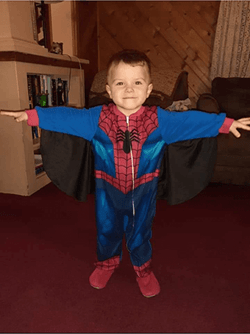Not all heroes wear capes. But some do, like Kade Krepps – an energetic 4-year-old who recently had a hole in the upper chambers of his heart fixed at UPMC Children’s Hospital.
Born and raised in Beaver County, Pa., Kade is the youngest of four siblings. According to his parents, Shana and Vernon, Kade has always been a big fan of superheroes, dancing, and baseball.
“He loves to dance and he’s very outgoing – his classmates all seem to flock to him,” says Shana.
“He dresses up in his superhero costumes every single day. He has almost every superhero costume possible, and it’s so funny watching him get dressed up. I have to pick him up and fly him around like he’s swinging. It’s been like that since the time he knew what superheroes were,” she adds.
 Before Kade began dressing up as his favorite heroes, around the time of his one-year checkup, his pediatrician heard a murmur when listening to his heart. After testing was completed, it was discovered that Kade’s heart had a hole in the top chambers, which was a bit larger than the natural hole that can be found in infants during the first six months of life. Hoping that the hole would still close on its own, they decided to watch and wait, closely monitoring Kade for any changes.
Before Kade began dressing up as his favorite heroes, around the time of his one-year checkup, his pediatrician heard a murmur when listening to his heart. After testing was completed, it was discovered that Kade’s heart had a hole in the top chambers, which was a bit larger than the natural hole that can be found in infants during the first six months of life. Hoping that the hole would still close on its own, they decided to watch and wait, closely monitoring Kade for any changes.
After two years, the hole, called an atrial septal defect, or ASD, had not closed. At this point, the Krepps were referred to UPMC Children’s for a cardiac catheterization to close the ASD.
“When I told his teachers that he was going to have to be out for a few days, they said that they had been wondering about that. Kade had told them that he had a broken heart, and he had to get it fixed,” says Shana.
Before the sun came up on Thursday, March 24, 2022, Kade and his parent’s made the hour-long drive to Pittsburgh, arriving before 6 a.m.
“It was amazing, we asked him if he was scared or nervous, but each time he said ‘no’,” says Vernon. “I was nervous, but the staff at Children’s was phenomenal. They made it so much easier for us — everyone we dealt with made the stay and experience that much nicer. You can tell it’s more than just a job for them. They actually cared.”
About an hour and half after they arrived, Kade’s catheterization began. Sara Trucco, MD, an interventional cardiologist in the Heart Institute at Children’s, placed a catheter-based device into Kade’s heart to block the hole. This minimally invasive procedure would help Kade avoid a larger, more invasive, open heart operation. A couple hours later, Kade’s “broken heart” had been fixed.
“He didn’t give the doctors any issues, no problems, nothing — they said he was one of the easiest patients that they had had in a long time,” says Vernon. The next day Kade was cleared and ready to go back home.
“Since the surgery, our biggest challenge has been trying to keep a 4-year-old from running around or jumping too much,” says Shana. “He goes around telling everyone that his heart is fixed, it’s not broken anymore. And since the surgery, he always asks if the food he’s eating is healthy.”
“He’s a normal, fun loving 4-year-old,” says Vernon.
And after some more recovery time, Kade will be back to dancing and flying like the superhero he is.









